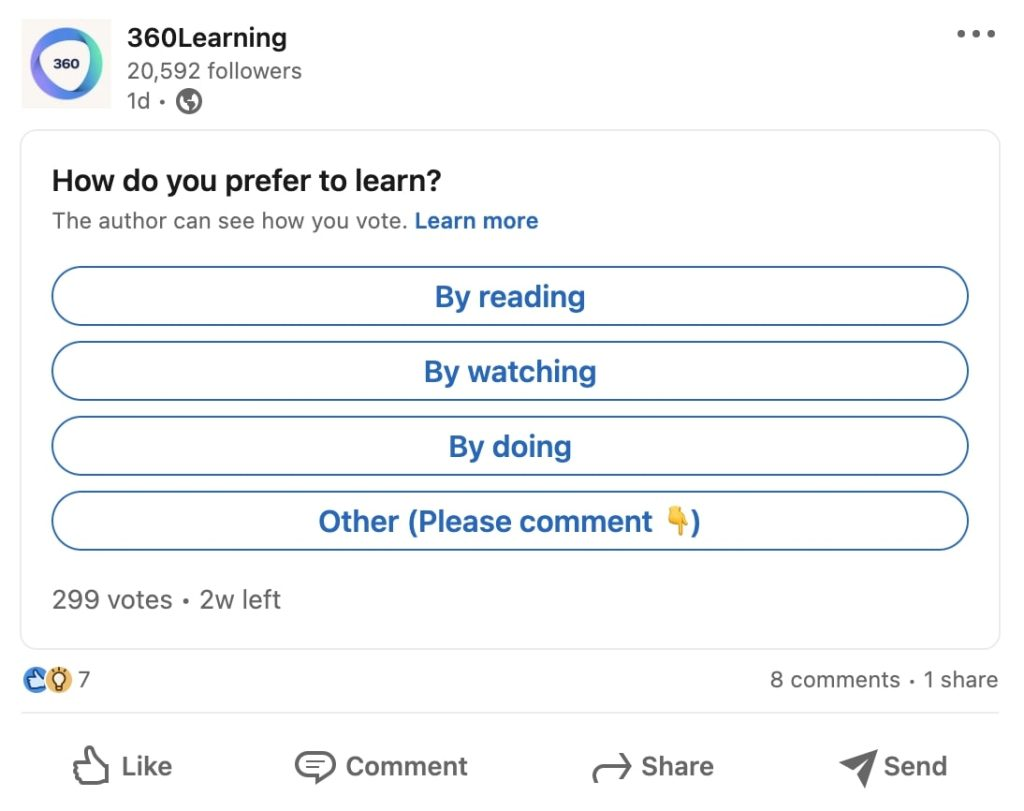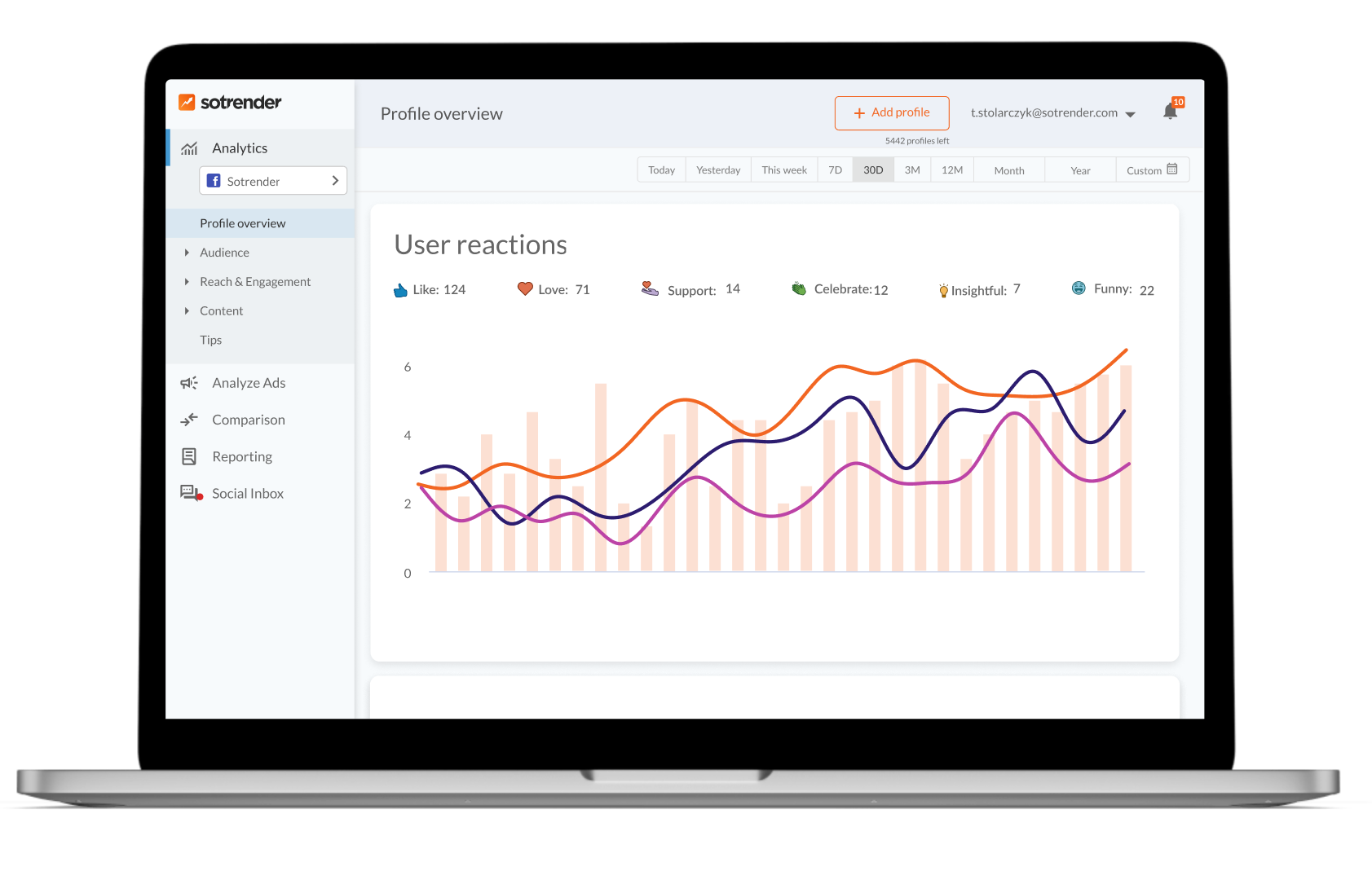People spend a lot of their time on social media. (143 minutes per day, to be exact!)
If you’re not present, you’re missing out on a valuable opportunity for brand exposure.
Let’s take a closer look at why social media marketing is essential for small businesses. We’ll also go over some top mistakes to avoid. And some tips you can use to stand out.
Why social media marketing is essential for small businesses
Social media helps small businesses connect with customers and grow their brands. With more people online than ever before, it’s one of the best ways to reach new audiences and build relationships. In fact, the number of social media users is projected to continue rising to almost six billion by 2027.
When done right, marketing on social media helps you stand out. Even in a crowded market.
Here are some of the top reasons social media marketing is important for your small business:
Customer engagement and sales
Social media is key to getting your customers involved with your brand.
You can ask engaging questions or run polls to gauge your audience’s interests. This will keep them coming back and make them feel valued, especially if you implement their feedback.
If you’re consistent and responsive, social media can be one of the best tools for boosting sales.
Customers who feel connected to your brand are more likely to repeat purchases. This is why you should use social media. Social media is essential for small businesses seeking to enhance customer relationships.
Competitive advantage
Using social media gives you a leg up over businesses that don’t use it effectively.
Many small businesses struggle to reach their full potential because they don’t engage with their audiences online. Being present where customers spend their time can help you win over customers.
Just remember to be consistent.
When you post regularly, you stay on your audience’s radar and keep your brand top of mind.
Budget-friendly
Social media is an affordable way to promote your business.
Posting on platforms like Facebook, Instagram, and LinkedIn is free. And you can set up paid ads for virtually any budget.
This makes social media a great tool for growing your audience without spending too much. You can create targeted ads to reach the right people and track how well they work so you’re not wasting money.
When you find out what works, you can reinvest the amount you made to increase your ad spend. Doing this over time helps you create a profitable system. (Without having to bootstrap the cash.)
9 Tips for small business social media success
Here are some of the best tips for social media success for small business owners.
Find your audience
Knowing who your target audience is makes all the difference.
Are they teens or adults? Consumers or business owners? What do they care about? What are their top problems, and how can you solve them?
Answering these questions helps you create content they’ll value. It’ll also help you build trust.
Once you know your audience, focus on the social platforms they use most. If your audience spends more time on Instagram than Facebook, that’s where you need to post. Instead of guessing, use tools like audience insights to get accurate data on your followers.
Document your strategy
It’s important to have a plan for your social media efforts. The most successful businesses have a documented strategy that outlines what they post, how often, and on which platforms.
Start by listing your social media goals. (I.e., increasing followers, driving website traffic, or boosting engagement.) Then, outline how you’ll achieve them. For example, you might decide to post three times a week on Instagram and once a week on Facebook. You might also choose to focus on user-generated content. And maybe even work with a micro-influencer.
Track your progress to see what’s working and what needs to change.
Build your tech stack
The right tools can make managing your social media much easier.
You’ll need software that helps you schedule posts, track analytics, and automate tasks.
APIs can help your different tools communicate with each other. For example, they can sync your CRM with your social media accounts or email marketing platform.
Managing multiple APIs might seem complicated, but using a secure open-source API gateway
can make this easier. It centralizes everything in one place. This makes it more secure and scalable for your small business. Plus, you won’t need to spend big bucks on complicated systems.
Create engaging, interactive content
It is important to post content that your audience wants to interact with. You can use quizzes, polls, or contests to get people involved.
For example, Beaches of Normandy Tours uses quizzes to teach followers about World War II landmarks. Its audience (mostly history buffs) loves participating in these. They also share them with friends, which expands the brand’s reach.
User-generated content can also be a powerful tool. Encourage your customers to share their experiences with your products or services and repost them. This creates a sense of community and shows that you value your customers’ input.
Be consistent
Posting regularly helps your audience know when to expect new content. It also shows that you’re committed to maintaining a relationship with them.
You don’t need to post every day, but consistency helps build trust. Use scheduling apps to stay on track and avoid missing posting on busy days.
This doesn’t mean posting for its own sake. You should always post quality content that keeps your audience engaged and returning for more.
Collaborate with industry peers
Working with others in your industry can help your business grow faster. Collaborating with peers exposes your brand to their audiences, too. You can do this by running joint campaigns or hosting giveaways together. (This type of partnership can lead to a referral network that benefits everyone.)
Building relationships with others in your industry also shows you’re a trusted part of the community. Customers tend to trust businesses that work well with others and are open to collaboration.
Repurpose content
Don’t feel like you have to create new content every time you post.
Repurposing content can save time and help you reach different audiences. For example, you can break a blog post into smaller parts for your social media posts. Or turn a successful Instagram post into a short video for TikTok.
The key to repurposing is making sure it feels fresh on each platform.
Instead of copying the same message across all channels, find creative ways to adapt it so it feels unique and delivers value.
Track the right metrics
Tracking your progress is vital to understanding what’s working and what isn’t. But don’t fall for “vanity metrics” like follower count. Instead, focus on engagement rates, website clicks, and conversions.
These show how your audience interacts with your content — and whether it leads to accurate results.
You might want to check Microsoft Dynamics 365 pricing to see if it fits your budget. A CRM system can help you manage customer interactions, track engagement, and personalize social media outreach. This allows you to better understand your audience and tailor your content to their needs.
Adjust your strategy as needed
Social media is constantly changing, and so should your strategy. What worked last year might not work now.
Check your analytics regularly to see if you’re still meeting your goals. If your engagement rates are dropping, it might be time to try a new type of content or focus on different channels.
Need help tracking and making sense of your data? Sotrender’s analytics tools give you detailed insights into your performance across platforms. From audience engagement to ad performance, we break down the numbers so you can focus on what matters – creating content that actually works.
Changing your strategy based on data helps you get the best return on your investment.
4 Mistakes to avoid
Avoid the following social media marketing mistakes as a small business.
Too many channels
Trying to be on every platform at once can spread you too thin. It’s better to focus on a few channels where your target audience is most active.
If you try to manage too many, you can burn out, experience inconsistency, and have a scattered brand image. Stick to what works and master those channels before adding more.
Inconsistent posting
Not posting regularly can harm your business. Customers might think you’re unreliable if they see your inactive social media account.
(Hint: Posting once and then going silent for weeks leaves a wrong impression.)
To avoid this, stick to a posting schedule, even if it means fewer posts overall.
Quality and consistency are what count.
Posting off-brand
Staying true to your brand’s voice and message is essential.
Posting content that doesn’t align with your brand can confuse your audience. It might make them question whether they understand who you are.
Stick to content that reflects your business’ identity, values, and goals.
Posting without engaging
Posting isn’t enough if you’re not responding to comments or messages.
Your customers expect you to be available. If they feel ignored, they might turn to your competitors.
Henry Meds, for example, actively responds to comments on Instagram about alternatives to Ozempic and other common questions. These interactions build trust and show customers you care.
Win social media for your small business
Social media is a powerful marketing tool when used right. Remember to keep things simple, track your progress, and adjust as needed.
Focus on:
- Customer engagement
- Building a tech stack
- Staying consistent
This will help you build trust.












